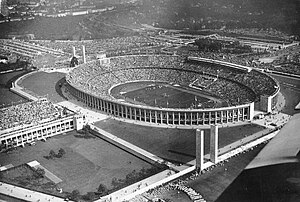1936 Summer Olympics / Athletics - 4 × 400 m (men)
|
|
|||

|
|||
| sport | athletics | ||
| discipline | 4 x 400 meter relay | ||
| gender | Men | ||
| Attendees | 48 athletes from 12 countries | ||
| Competition location | Olympiastadion Berlin | ||
| Competition phase | August 8, 1936 (preliminary) August 9, 1936 (final) |
||
| Winning time | 3: 09.0 min | ||
|
|||
The men's 4 x 400 meter relay at the 1936 Olympic Games in Berlin was held on August 8 and 9, 1936 in the Olympic Stadium in Berlin . There were 12 relays with 48 athletes.
The British relay won the gold medal with runners Freddie Wolff , Godfrey Rampling , Bill Roberts and Godfrey Brown . Silver went to the US team consisting of Harold Cagle , Robert Young , Edward O'Brien and Alfred Fitch . The German relay team won the bronze medal with Helmut Hamann , Friedrich von Stülpnagel , Harry Voigt and Rudolf Harbig .
Existing records
- World record : 3: 08.2 min - USA ( Ivan Fuqua , Edgar Ablowich , Karl Warner , Bill Carr ), Los Angeles , August 7, 1932
- Olympic record : 3: 08.2 min - USA ( Ivan Fuqua , Edgar Ablowich , Karl Warner , Bill Carr ), Los Angeles final , August 7, 1932
Conducting the competition
On August 8th, three preliminary runs were completed. The two best teams qualified for the final on August 9th.
Note: The qualified relays are highlighted in light blue.
Prelims
August 8, 1936, 4.30 p.m.
Weather conditions: overcast, 19.4 ° C, wind speeds of approx. 1.5 m / s.
Not all times have been passed down.
Forward 1
| space | Season | occupation | time | annotation |
|---|---|---|---|---|
| 1 |
|
Harold Cagle Robert Young Edward O'Brien Alfred Fitch |
3: 13.0 min | |
| 2 |
|
Tibor Ribényi Zoltán Zsitva József Vadas József Kovács |
3: 17.0 min | |
| 3 |
|
Tadeusz Śliwak Antoni Maszewski Kazimierz Kucharski Klemens Biniakowski |
3: 17.6 min | |
| 4th |
|
Aihara Toyoyi Ichihara Masao Cho Seiken Kubota Hiroyoshi |
3: 18.4 min |
Forward 2
| space | Season | occupation | time | annotation |
|---|---|---|---|---|
| 1 |
|
Freddie Wolff Godfrey Rampling Bill Roberts Godfrey Brown |
3: 14.4 min | |
| 2 |
|
Sven Strömberg Per Edfeldt Olof Danielsson Bertil von Wachenfeldt |
3: 14.6 min | |
| 3 |
|
Raymond Boisset Georges Guillez Georges Henry Prudent Joye |
3: 15.2 min |
Forward 3
| space | Season | occupation | time | annotation |
|---|---|---|---|---|
| 1 |
|
Helmut Hamann Friedrich von Stülpnagel Harry Voigt Rudolf Harbig |
3: 15.0 min | |
| 2 |
|
Marshall Limon Phil Edwards William Fritz John Loaring |
3: 15.0 min | |
| 3 |
|
Angelo Ferrario Marsilio Rossi Otello Spampani Mario Lanzi |
3: 16.6 min | |
| 4th |
|
Willie Botha Frank Rushton William Lindeque Denis Shore |
3: 17.8 min | |
| 5 |
|
Heinz Helmut Lorenz Evžen Rošický Břetislav Krátký Karel Kněnický |
3: 22.2 min |
final
| space | Season | occupation | time | annotation |
|---|---|---|---|---|
| 1 |
|
Freddie Wolff Godfrey Rampling Bill Roberts Godfrey Brown |
3: 09.0 min | |
| 2 |
|
Harold Cagle Robert Young Edward O'Brien Alfred Fitch |
3: 11.0 min | |
| 3 |
|
Helmut Hamann Friedrich von Stülpnagel Harry Voigt Rudolf Harbig |
3: 11.8 min | |
| 4th |
|
Marshall Limon Phil Edwards William Fritz John Loaring |
3: 11.8 min | |
| 5 |
|
Sven Strömberg Per Edfeldt Olof Danielsson Bertil von Wachenfeldt |
3: 13.0 min | |
| 6th |
|
Tibor Ribényi Zoltán Zsitva József Vadas József Kovács |
3: 14.8 min |
August 9, 1936, 3:45 p.m.
Weather conditions: sunny, 22 ° C, wind speed of 1.6 m / s.
As in the 1932 Olympic Games over 4 x 400 meters , the Americans did not use their strongest runners in this competition, Olympic champion Archie Williams and Olympic third-party James LuValle . They assumed that their understudy would also win the gold medal without any problems. But this time they had miscalculated. After the starting runners, the Canadians surprisingly led the USA and Great Britain, who took the lead in front of the USA and Canada on the second change. On the third leg, the British increased their lead over the US Americans and Germany was now well ahead of Canada in third place. This order did not change with the final runners. Great Britain went gold by a clear margin over the US season. In a tough fight with the Canadians, the German relay narrowly claimed the bronze medal.
The Olympic record , which was also the world record set by the US squadron at the previous games, remained here, but the British only stayed eight tenths of a second above it.
literature
- Ekkehard zur Megede , The History of Olympic Athletics, Volume 1: 1896-1936, Verlag Bartels & Wernitz KG, Berlin, 2nd edition 1970, pp. 304f
Web links
- SportsReference 4 × 400 m , accessed on September 21, 2017
- Official report pp. 659–660, engl. (PDF), accessed on September 21, 2017
- 1936, 4x400m, Men, Olympic Games, Berlin , published on August 12, 2013 on youtube.com, accessed on September 21, 2017
Individual evidence
- ^ IAAF Statistics Handbook, Berlin 2009 Page 562 ( Memento from June 29, 2011 in the Internet Archive )
- ↑ a b Official report p. 660, engl. (PDF)
- ↑ SportsReference (Eng.)